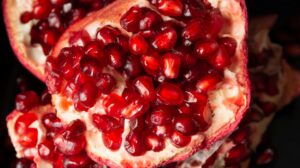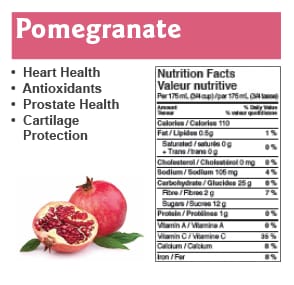Copyright © 2024 MATHAKADARA – All Rights Reserved.
Special Proteins in Pomegranate
Special proteins in pomegranate

The pomegranate (Punica granatum) is a fruit-bearing deciduous shrub in the family lythraceae, subfamily Punicoideae, that grows between 5 and 10 m (16 and 33 ft) tall.Young pomegranate in Side, Turkey The pomegranate was originally described throughout theMediterranean region. It was introduced into Spanish America in the late 16th century and into California by Spanish settlers in 1769.The fruit is typically in season in the Northern Hemisphere from October to February, and in the Southern Hemisphere from March to May. As intact sarcotestas or juice, pomegranates are used in baking, cooking, juice blends, meal garnishes, smoothies, and alcoholic beverages, such as cocktails and wine. Pomegranates are widely cultivated throughout the Middle East and Caucasus region, north and tropical Africa, Iran, Armenia, the Indian subcontinent, Central Asia, the drier parts of Southeast Asia, and the Mediterranean Basin.
How much proteins does pomegranate have?

The average (or more correctly the arithmetic mean) amount of protein contained in100g of pomegranate, based on the list below of 2 different items under the general description of pomegranate, is 0.91 g of protein. This average value corresponds to 1.63 % of the recommended dietary allowance (or RDA) in your diet.
Boosts Heart Health

pomegranate is so good for systolic blood pressure, it’s not surprising that this delicious beverage is also excellent for heart health. It contains antioxidants at higher levels than many other fruit juices, which is why it can be so helpful to the heart. Research published in Clinical Nutrition studied. pomegranate juice consumption by patients with carotid artery stenosis, which is a narrowing of either of the two key arteries located in the front of the neck, through which blood from the heart goes to the brain.
High In Fiber

The pomegranate is certainly a high-fiber fruit with more than 11 grams of fiber per fruit.A higher dietary fiber intake is consistently and significantly associated with many benefits.Most notable among these, fiber is strongly associated with a lower risk of cancer, cardiovascular, and all-cause mortality .
May Lower Inflammation and Improve Oxidative Stress

While some inflammation is a normal part of healing and repair, chronically high levels of inflammation are associated with numerous chronic diseases.Oxidative stress is characterized by an excessively high level of free radicals in the body that overwhelm the body’s defense (antioxidant) system. Once again, chronically high levels of oxidative stress can cause damage to various tissues, and it is linked with chronic disease. Interestingly, findings from several studies suggest that pomegranate may potentially lower inflammation and oxidative stress levels. However, the results are somewhat mixed.




Hi, this is a comment.
To get started with moderating, editing, and deleting comments, please visit the Comments screen in the dashboard.
Commenter avatars come from Gravatar.